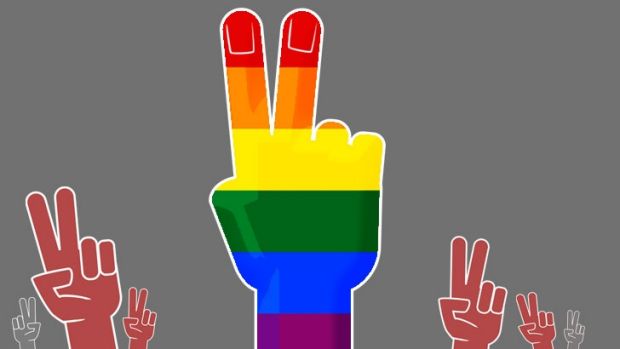Gosh, we’re an ignorant lot. And one thing we seem to be particularly ignorant about is transgender. Which makes a lot of people very angry.
British novelist Ian McEwan discovered this when he gave a speech at the Royal Institution. He said that today the self, “like a consumer desirable, may be plucked from the shelves of a personal identity supermarket, a ready-to-wear little black number”.

It is hugely offensive to dismiss those who struggled for decades to be who they are, as simply searching for the right frock. Comedian Eddie Izzard said: “I didn’t pull anything off the shelf. I knew when I was four and I came out when I was 23, that was 31 years ago, surely we have moved on … That’s so backward looking it’s like the sixties never happened to him.”
In a way we do seem to be reliving some of the unresolved disputes of the 1960s.

For McEwan was also talking about a lingering, subterranean, uncomfortable dispute between some feminists and transwomen about what it means to be female. The clash, as it so often has when it comes to women, often erupts over physical attributes, and physical spaces. As McEwan said: “some men in full possession of a penis are now identifying as women and demanding entry to women-only colleges, and the right to change in women’s dressing rooms.” (There have been also protests at music festivals in Michigan and Victoria about the exclusion of trans women from women’s events.)
After the speech, he told a questioner: “Call me old-fashioned, but I tend to think of people with penises as men. But I know they enter a difficult world when they become transsexuals and they tell us they are women, they become women, but it’s interesting when you hear the conflict between feminists now and people in this group.”
Right on both fronts: you are old fashioned, Ian, and it is interesting.
But the conflict he identifies is not new, it’s decades old and it’s not growing, it’s shrinking. What is commonly called TERF, or Trans Exclusionary Radical Feminism, holds that people identified as male at birth can never be women.
In 1977, when writing about tennis player Renee Richards, Gloria Steinem wrote “feminists are right to feel uncomfortable about the need for and uses of transsexualism…. If the shoe doesn’t fit, must we change the foot?”. But in 2013, Steinem regretted these views, saying: “I believe that transgender people, including those who have transitioned, are living out real, authentic lives. Those lives should be celebrated, not questioned.”
Not all have shifted. Germaine Greer was slammed for saying at Cardiff University: “I don’t believe a woman is a man without a cock.” Camille Paglia bizarrely dismissed transsexualism as a fashion. Both are persistently torn down for these views; Greer was recently “glitterbombed”.
So it was hardly a surprise McEwan was lambasted on Twitter. Former sex worker @belledejour, author Dr. Brooke Magnanti said: “Yer dad’s fave novelist needs to know what your genitals look like.” Transgender journalist Paris Lees wrote: “Ian McEwan. Posh. White. Patronising. Saga reader. Using large media platform to air completely unnecessary prejudices. Join the queue, luv!”
No one contacted McEwan to ask him to clarify his views. But in response to the squall he wrote an open letter, published in the Guardian, in which he said: “I proposed that the possession of a penis or, more fundamentally, the inheritance of the XY chromosome, is inalienably connected to maleness. As a statement, this seems to me biologically unexceptional. However, biology is not always destiny. That the transgender community should want or need to abandon their birth gender or radically redefine it is their right, which should be respected and celebrated. It adds to the richness and diversity of life. It’s an extension of freedom and the possibilities of selfhood. Everyone should deplore the discrimination that transgender communities have suffered around the world.”
He also took aim at the “charged atmosphere” at many US campuses, where students seek “safe spaces”, “trigger warnings” and “no-platforming” of speakers they disagree with. This, he said, “represents an assault on freedom of expression – an assault that will, regrettably, be familiar to members of the transgender community worldwide.” This is a fine point.
LGBTQI lobby group Stonewall said it was good McEwan acknowledged the hurt he caused, but his comments “did nothing to help” transgender people and would only further isolate them and “entrench transphobic attitudes.”
Not what we want. But is that always the case? Or are the public airing, the ensuing criticism, and clarification actually often a crucial part of social change? We don’t automatically imbibe the way other people think, nor should we. And there is an enormous amount of dissent in this space, especially within the LGBTQI community. History tells us censoring views doesn’t protect basic rights, it quashes them. If we don’t exercise our brains by listening to those with whom we disagree, our intellectual muscles will become flaccid. And ignorance is fuelled by lack of exposure and information.
We must be able to say stupid things, and ask stupid questions. And if we only allow a small group of people to speak about gender, we will place sustained pressure on the small number of trans people in the public eye who are expected to be able to publicly transition, relentlessly explain their decision, counter ignorance and carry the can for the rest of the community every day – an exhausting load. It’s not their job to educate us.
Transphobia is ugly and must be fought. And I reckon the airing – and combating – of ill-informed ideas is often the best way to usher them out. For we are surely getting to the point when ignorance can no longer be an excuse.
